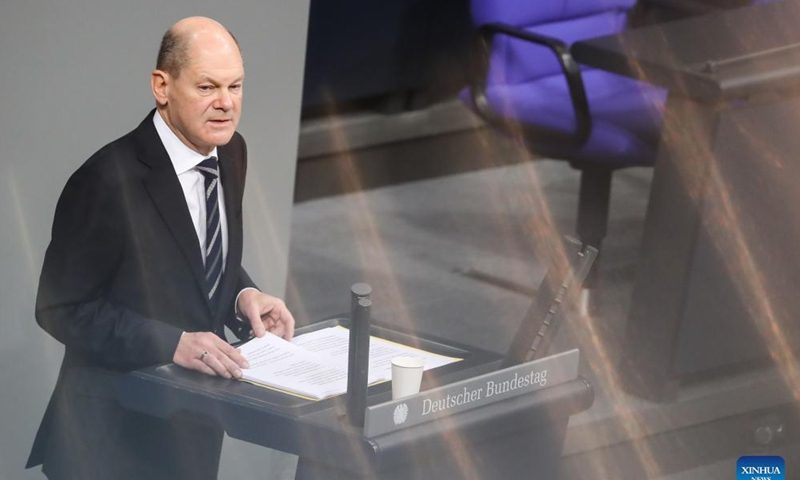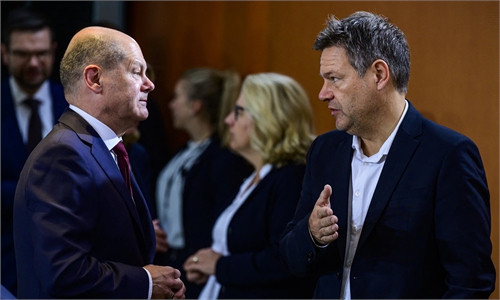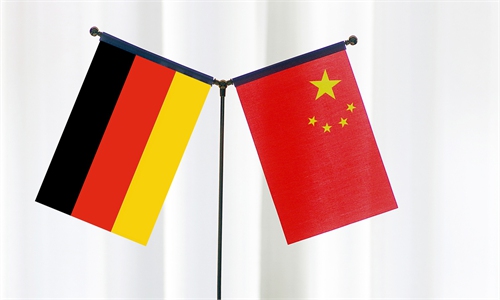Scholz defends his China position, ‘hits brakes’ on EU’s extreme confrontational direction

German Chancellor Olaf Scholz delivers his first government statement at the Reichstag building in Berlin Dec. 15, 2021, after he was elected as the new federal chancellor Dec. 8. Photo:Xinhua
Amid pressure from the US and EU nations, German Chancellor Olaf Scholz defended his China position one day before his trip to Beijing, stressing that Germany doesn't want to decouple from China, and the country's rise did not justify "the calls by some to isolate China."
Although Scholz also called for a change in the way of dealing with China and pushes China on the Ukraine crisis and the Taiwan question, Chinese experts said Scholz's voice and trip should be viewed as "slamming the brakes" on the extreme confrontational direction in which Europe is moving, and may represent a return to "developing relations with China rationally."
In an article published on Politico and the German newspaper Frankfurter Allgemeine Zeitung on Thursday, Scholz stressed "the way that we deal with China must change," as well as the need to reduce "risky dependencies" in industrial supply chains, especially when it comes to cutting-edge technologies. However, he also suggested that the US should not drag Germany into bloc confrontation with Beijing.
"Of all the countries in the world, Germany — which had such a painful experience of division during the Cold War — has no interest in seeing new blocs emerge in the world," read Scholz's article. "Even in changed circumstances, China remains an important business and trading partner for Germany and Europe — we don't want to decouple from it."
"The past half century of exchanges and cooperation has fully demonstrated that China and Germany have more common ground than differences, cooperation far outweighed competition, and we are partners rather than rivals. Both sides have benefited from each other's development and practical cooperation," Chinese Foreign Ministry spokesperson Zhao Lijian said at a press briefing on Thursday.
A sound China-Germany relationship not only benefits the two countries, but also China, Europe and the world, Zhao said, "China will continue to uphold the principle of pragmatic cooperation and mutual benefit and work with Germany to further promote bilateral relations and contribute more to world peace and stability."
Scholz is set to visit Beijing and meet with Chinese President Xi Jinping, along with a delegation of senior business leaders, including the chief executive officers of Deutsche Bank, Siemens, vaccine maker BioNTech and BMW, media reported.
Sun Keqin, a research fellow at the China Institutes of Contemporary International Relations, told the Global Times on Thursday that as the first G7 leader to visit China since the start of the COVID-19 pandemic, Scholz is facing huge pressure both at home and in Europe, given the current political correctness in countering China and leaning toward the US.
While Scholz is on his Beijing trip, the foreign ministers from the G7 group, including US Secretary of State Antony Blinken, meet in Germany from Thursday to Friday. Germany's foreign minister Annalena Baerbock, from the coalition partner Green Party, which has always shown a pro-US stance, recently said that Berlin's China strategy needed to be more assertive.
Scholz represented the realistic interests of Germany and Europe, backed by a force that emphasized healthy cooperation between China, Germany and Europe, Sun said.
Scholz's trip would bring a return to rational thinking on relations with China, which is a positive sign for those who promote the development of China-EU relations, Sun said.
Scholz's visit to China is a "slamming of the brakes" on the extreme confrontational direction in which Europe is moving, Sun said.
"We must explore where cooperation remains in our mutual interest. We will seek cooperation where it lies in our mutual interest, but we will not ignore controversies either. For that is part and parcel of a candid exchange between Germany and China," Scholz said in his article.
2022 marks the 50th anniversary of the founding of China-Germany diplomatic relations. The sound development of China-Germany relations in the past has been a good example of seeking common ground while shelving differences and pursuing win-win cooperation, analysts said.
From the beginning of the establishment of diplomatic relations to the present, the ideology and social system of China and Germany have been different and have not changed. It is the US that has elevated ideology to a strategic level and called on its Western allies to contain China, a Beijing-based international relations expert told the Global Times.
Although China has the most complete industrial capacity and industrial product layout in the world, it is also interdependent with the rest of the world, which is an inevitable form of globalization. Normal economic and trade relations should not be politicized or demonized, the expert said.



